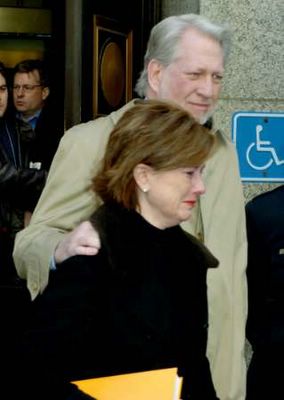Wednesday, March 16, 2005

Former WorldCom Inc. Chief Executive Bernard Ebbers (R) puts his arm around his tearful wife, Kristy (L), as they leave court after Ebbers was found guilty by a federal jury of fraud charges related to the $11 billion accounting scandal at the telecommunications company, March 15, 2005 in New York. Ebbers, 63, was also found guilty of conspiracy and filing false documents with regulators. He faces up to 85 years in prison when he is sentenced. REUTERS/Henny Ray Abrams
NEWS ANALYSIS
Ebbers, on Witness Stand, May Have Lost His Case
By JONATHAN D. GLATER and KEN BELSON
On trial for perpetrating one of the biggest corporate frauds ever, Bernard J. Ebbers, the former chief executive of WorldCom, helped to convict himself.
"It hurt him," said one juror, who asked not to be identified.
The devastating impact of Mr. Ebbers's testimony on the witness stand highlights the Catch-22 facing defendants and their lawyers in criminal cases: testify and risk a bad performance during cross-examination, or refuse to testify and risk having jurors rely on the prosecutors' characterizations. For Mr. Ebbers, having seen his legacy shattered and facing the prospect of spending the rest of his life in prison, there was little choice.
The government's principal accusations against him were based on the testimony of Scott D. Sullivan, WorldCom's former chief financial officer, who pleaded guilty to fraud charges. Mr. Sullivan offered the only direct evidence that Mr. Ebbers had known about the fraud. To leave unanswered his version of events was too dangerous, Mr. Ebbers's lawyer has said.
But Mr. Ebbers's evasiveness and defensive posture on cross-examination left a lasting impression on jurors hearing his case in federal court in Manhattan.
The jury clearly concluded that the testimony of Mr. Sullivan was more credible than that of Mr. Ebbers, even though the jurors did not fully believe Mr. Sullivan either, according to Peter Nulty, the father of Sarah Nulty, juror No. 10. Mr. Nulty posted his daughter's views of the jury's deliberations at estrong.com, a financial newsletter's Web site, last night, writing that "no one on the jury trusted the testimony of the prosecution's star witness."
The verdict was a victory for prosecutors, for whom a verdict of not guilty would have been a black eye. It was a crushing defeat for Mr. Ebbers's lawyers, who built a solid case but ultimately failed to win the credibility battle. "Nobody looked at this case as a lay-down case for the government," said Sean O'Shea, a criminal defense lawyer in New York. "It was a high-risk play."
Members of the jury took their responsibilities seriously, the juror who asked not to be named said in a telephone interview last night. That was why deliberations took eight days and jurors asked to review dozens of documents. "It was just for reviewing. It took so long," the juror said. "A lot of testimony we heard weeks, even months ago."
And jurors did not want to make a mistake, he said. "Everybody just wanted to be sure, really, that's all."
The jury did not go through the charges in order but took first what they considered easier allegations, involving filing of false documents with the Securities and Exchange Commission. They then moved to the more difficult charge of conspiracy.
"We went pretty much to the securities on down, and then went to the conspiracy," the juror said. "That was the count we wanted to look at in depth."
In the pre- Enron era, the case against Mr. Ebbers might have been settled, several lawyers said. But the thirst for retribution from investors, employees and others burned by the enormous fraud at WorldCom and other companies is too strong.
The unwillingness of the government to offer a decent plea-bargaining agreement left Mr. Ebbers with little choice but to go to trial. And once on trial, it became essential for Mr. Ebbers to respond directly to Mr. Sullivan's testimony that he was directed by Mr. Ebbers to make the fraudulent accounting changes.
Yet some lawyers, like Mr. O'Shea, said that the Ebbers case was winnable for the defense. "Sometimes defense lawyers get called upon to try cases where it's just very, very difficult," Mr. O'Shea said. "One, the evidence is very difficult. Two, the environment is very difficult."
Reid H. Weingarten, Mr. Ebbers's lawyer, also had significant obstacles to overcome. For one thing, some central facts about the fraud were not at issue.
"Ebbers's counsel couldn't dispute there was fraud since Sullivan had pled guilty to it," said Jason Brown, a former federal prosecutor who now practices at Holland & Knight in New York. "Typically you want to defend a case by arguing that these are complicated issues that don't rise to the level of a fraud."
But according to Mr. Nulty's Web site posting, the jury "concluded that with his personal fortune evaporating and the company he built sinking, it was inconceivable that Ebbers was not paying attention" to the details of WorldCom's finances.
The conviction does not have a direct effect on other cases against high-profile executives, but in subtle and indirect ways, it may, said Melinda Haag, former chief of the white-collar section of the United States attorney's office in San Francisco and now a partner at Orrick Herrington & Sutcliffe.
"You have to hope and believe that the cases are fact-specific, and that the fact there was a conviction in this case means nothing," Ms. Haag said. "But the concern in the defense bar is, jurors are affected when they see this kind of thing." The trial of Mr. Ebbers took its toll on members of the jury, too, said a third juror reached by telephone last night. Wearily, she said, "I want my life back, is all."
Copyright 2005 The New York Times Company | Home | Privacy
